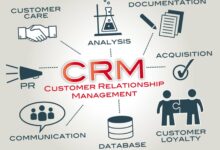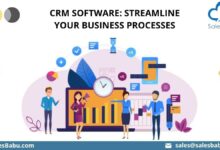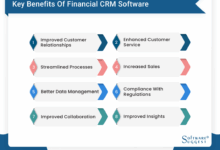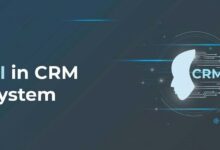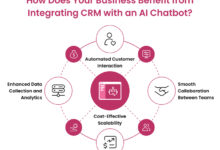Top Cloud-Based CRM Platforms: A Comprehensive Overview
Top Cloud-Based CRM Platforms take the spotlight in this detailed exploration, offering insights into the key features, benefits, and customization options that set them apart in the digital landscape.
From Salesforce CRM to Zoho CRM, each platform brings unique strengths to the table, empowering businesses to streamline operations and enhance customer relationships with ease.
Overview of Top Cloud-Based CRM Platforms
In today’s digital age, cloud-based CRM platforms have become essential tools for businesses of all sizes to manage customer relationships effectively. These platforms are hosted on remote servers and accessed through the internet, providing flexibility and scalability to meet the evolving needs of businesses.
Key Features of Cloud-Based CRM Platforms
- Centralized customer data storage
- Automated task management
- Real-time analytics and reporting
- Mobile access for on-the-go productivity
- Integration with other business tools
Benefits of Using Cloud-Based CRM Platforms for Businesses
- Cost-effectiveness with subscription-based pricing
- Scalability to accommodate business growth
- Improved collaboration and communication among teams
- Enhanced customer experience through personalized interactions
Differences from Traditional CRM Systems
Cloud-based CRM platforms offer advantages over traditional on-premise systems such as easier access, automatic updates, and reduced hardware costs. They also provide greater flexibility and customization options to tailor the CRM system to specific business needs.
Pricing Models of Different Cloud-Based CRM Platforms
- Monthly subscription plans based on user count
- Tiered pricing levels with varying features
- Pricing based on storage and advanced functionalities
Customization Options in Cloud-Based CRM Platforms
- Customizable dashboards and reports
- Workflow automation and process customization
- Integration with third-party apps and plugins
Security Measures Implemented by Top Cloud-Based CRM Platforms
- Encrypted data transmission and storage
- Role-based access controls
- Regular security audits and updates
Step-by-Step Guide on Migrating Data to a Cloud-Based CRM Platform
- Assess current data sources and clean up data for migration
- Select a suitable cloud-based CRM platform for your business needs
- Backup existing data and create a migration plan
- Map data fields and import data into the new CRM system
- Test data integrity and train users on the new platform
Integration Capabilities of Cloud-Based CRM Platforms with Other Business Tools
Cloud-based CRM platforms offer seamless integration with popular business tools such as email marketing platforms, accounting software, and e-commerce platforms. This integration streamlines workflows, improves data accuracy, and enhances overall efficiency in managing customer relationships.
Salesforce CRM
Salesforce CRM is a leading cloud-based customer relationship management platform that offers a wide range of features to help businesses manage their customer interactions effectively.
Features Offered by Salesforce CRM
- Lead management
- Opportunity management
- Sales forecasting
- Marketing automation
- Customer service and support
- Workflow automation
- Integration with third-party applications
Scalability of Salesforce CRM
Salesforce CRM is highly scalable, catering to the needs of businesses of all sizes, from startups to large enterprises. It offers different editions and pricing plans to accommodate varying business requirements.
Pricing Plans of Salesforce CRM
- Essentials: $25 per user per month
- Professional: $75 per user per month
- Enterprise: $150 per user per month
- Unlimited: $300 per user per month
Success Stories of Businesses Using Salesforce CRM
Companies like Spotify, Adidas, and AWS have successfully utilized Salesforce CRM to enhance their customer relationships and drive business growth.
Integrating Third-Party Applications with Salesforce CRM
Integrating third-party applications with Salesforce CRM is a streamlined process through APIs and connectors. Businesses can easily connect tools like MailChimp, Zendesk, and Slack to enhance their CRM capabilities.
Setting Up Automated Workflows in Salesforce CRM
- Go to Setup in Salesforce CRM.
- Click on Process Automation and select Workflow Rules.
- Create a new rule and define the criteria.
- Add workflow actions such as email alerts, field updates, or tasks.
- Activate the workflow rule to start automation.
Security Measures in Salesforce CRM
Salesforce CRM ensures robust security measures such as encryption, user authentication, and access controls to protect sensitive data. It complies with industry standards like GDPR and HIPAA.
Customization Options for Reports and Dashboards in Salesforce CRM
- Custom report types
- Drag-and-drop dashboard builder
- Dynamic dashboards
- Filtering and grouping options
Utilization of AI and Machine Learning in Salesforce CRM
Salesforce CRM leverages AI and machine learning technologies to provide predictive analytics for sales forecasting, lead scoring, and customer insights. This helps businesses make data-driven decisions and improve their overall performance.
HubSpot CRM
HubSpot CRM is a cloud-based customer relationship management platform that offers a range of functionalities to help businesses manage customer interactions, track sales activities, and analyze data effectively.
Key Functionalities of HubSpot CRM
- HubSpot CRM allows businesses to store and manage customer information in a centralized database, making it easy to track interactions and communication history.
- The platform offers tools for email tracking, lead scoring, and sales pipeline management to streamline the sales process and improve conversion rates.
- HubSpot CRM provides in-depth analytics and reporting features to help businesses gain insights into their sales performance and customer behavior.
Integration with Popular Tools
- HubSpot CRM seamlessly integrates with popular email platforms like Gmail and Outlook, allowing users to sync their email communication and contacts with the CRM system.
- The platform also integrates with Zapier, enabling users to connect HubSpot CRM with hundreds of other apps and automate workflows for increased productivity.
User Interface of HubSpot CRM
HubSpot CRM offers a user-friendly interface with a customizable dashboard that allows users to track key metrics and access important information at a glance. The intuitive navigation makes it easy for users to navigate between different sections of the CRM and perform tasks efficiently.
Industry Examples of HubSpot CRM Usage
- In the e-commerce industry, businesses use HubSpot CRM to manage customer data, track online sales, and personalize marketing campaigns for better customer engagement.
- SaaS companies benefit from HubSpot CRM’s lead management tools to track trial users, nurture leads, and convert them into paying customers effectively.
- In the real estate sector, HubSpot CRM helps agents organize property listings, track client interactions, and automate follow-up processes to improve lead conversion rates.
Zoho CRM
Zoho CRM offers a range of customization options to tailor the platform to your specific business needs. From personalizing fields to layouts and modules, users have the flexibility to create a CRM system that fits their unique requirements.
Customization Options in Zoho CRM
- Personalize fields: Easily add, modify, or delete fields to capture the information that matters most to your business.
- Customize layouts: Arrange the layout of records to display relevant data prominently for improved user experience.
- Module customization: Create custom modules to track specialized information and enhance organizational efficiency.
Automation Capabilities in Zoho CRM
- Workflow rules: Automate routine tasks and processes by setting up rules that trigger actions based on specified criteria.
- Macros: Streamline repetitive actions with macros to save time and improve productivity.
- Blueprint: Visualize and automate your sales processes with Blueprint, ensuring consistency and efficiency in your workflow.
Mobile Access and Compatibility in Zoho CRM
Zoho CRM offers a mobile app that enables users to access their CRM data on the go. The app is compatible with both iOS and Android devices, providing a seamless experience for users regardless of their operating system. Features such as lead management, deal tracking, and real-time notifications are available on the mobile app for enhanced productivity.
Optimizing Workflows in Zoho CRM
- Setting up automation: Leverage automation features in Zoho CRM to streamline processes and reduce manual effort.
- Integration with other tools: Integrate Zoho CRM with other business applications to create a unified workflow and enhance data sharing.
- Streamlining processes: Identify bottlenecks in your workflows and optimize them for maximum efficiency and productivity.
Creating and Managing Reports in Zoho CRM
- Report types: Generate various types of reports in Zoho CRM, such as sales reports, performance reports, and forecasting reports.
- Customization options: Customize report layouts, filters, and data fields to extract meaningful insights from your CRM data.
- Data visualization techniques: Utilize charts, graphs, and dashboards to present data visually for better analysis and decision-making.
Microsoft Dynamics 365 CRM
Microsoft Dynamics 365 CRM is a powerful cloud-based CRM platform that offers a wide range of features to help businesses effectively manage their customer relationships.
Integration with Microsoft Products
Microsoft Dynamics 365 CRM seamlessly integrates with other Microsoft products such as Office 365, Outlook, and SharePoint. This integration allows for a more streamlined workflow and ensures that all relevant data is easily accessible across different platforms.
Customer Service Features
Microsoft Dynamics 365 CRM provides robust customer service features, including case management, knowledge base, and self-service portals. These features help businesses deliver exceptional customer service and support, leading to increased customer satisfaction and loyalty.
Analytics and Reporting Tools
Microsoft Dynamics 365 CRM offers advanced analytics and reporting tools that enable businesses to gain valuable insights into their customer data. With features such as dashboards, reports, and real-time analytics, businesses can make informed decisions and drive their sales and marketing efforts more effectively.
Use Case Scenario
A manufacturing company implements Microsoft Dynamics 365 CRM to streamline their sales process and improve customer relationships. By leveraging the platform’s integration with Microsoft products, they are able to access customer data from Outlook and Office 365, leading to more personalized interactions. The analytics and reporting tools in Microsoft Dynamics 365 CRM also help the company track sales performance and identify areas for improvement, ultimately driving revenue growth and customer satisfaction.
Pipedrive
Pipedrive is a popular cloud-based CRM platform known for its user-friendly interface and robust sales pipeline management features.
Sales Pipeline Management in Pipedrive
- Pipedrive offers a visual and intuitive sales pipeline interface that allows users to easily track their deals and progress through different stages.
- Users can customize their pipeline stages, add deals, set reminders, and track activities all in one place, making it easier to manage sales processes efficiently.
- With drag-and-drop functionality, users can quickly move deals across stages, prioritize tasks, and focus on closing deals effectively.
Comparison of User Interface
- The user interface of Pipedrive is clean, simple, and easy to navigate, making it ideal for sales teams of all sizes.
- Compared to other CRM platforms, Pipedrive’s interface is designed to prioritize sales activities and provide a seamless user experience.
- Users can access key information, reports, and analytics with just a few clicks, enhancing productivity and decision-making.
Collaboration and Team Management Tools
- Pipedrive offers collaboration features such as shared calendars, email integration, and team activity tracking to streamline communication and workflow.
- Team members can assign tasks, share notes, and collaborate on deals within the platform, promoting transparency and accountability.
- Managers can track team performance, set goals, and provide coaching based on real-time data and insights from Pipedrive’s team management tools.
Lead Generation Strategies with Pipedrive
- Utilize Pipedrive’s lead capturing forms and integrations with marketing tools to generate and track leads effectively.
- Segment leads based on criteria such as lead source, industry, or deal size to personalize communication and follow-up strategies.
- Automate lead nurturing processes using Pipedrive’s automation features to engage leads at the right time and improve conversion rates.
Insightly CRM
Insightly CRM is a cloud-based CRM platform designed to cater to the needs of small and medium-sized businesses, offering a range of features to help streamline sales, marketing, and project management processes.
Project Management Capabilities
- Insightly CRM provides robust project management capabilities, allowing users to create and track projects, tasks, and milestones.
- Users can assign tasks to team members, set deadlines, and track progress in real-time, ensuring projects are completed on time and within budget.
- The platform also offers integration with popular project management tools like Trello and Asana, allowing for seamless collaboration and workflow management.
Email Marketing Integrations
- Insightly CRM integrates with popular email marketing platforms like MailChimp and Constant Contact, enabling businesses to create targeted email campaigns and track engagement metrics.
- Users can segment their contacts based on demographics, behavior, and interactions, ensuring that the right message reaches the right audience at the right time.
- Automation features allow for personalized and timely communication with leads and customers, improving overall engagement and conversion rates.
Sales Improvement Examples
- A software company increased sales by 30% after implementing Insightly CRM to streamline their sales process, track leads, and automate follow-up activities.
- A small consulting firm saw a 20% increase in customer retention rates by using Insightly CRM to manage customer relationships, track interactions, and provide personalized services.
- An e-commerce business improved their sales conversion rates by 25% by leveraging Insightly CRM’s analytics and reporting tools to identify and target high-value customers effectively.
Freshworks CRM
Freshworks CRM is a cloud-based customer relationship management platform that offers a range of AI-powered features to enhance user experience and streamline business operations.
AI-powered features of Freshworks CRM
- AI-powered lead scoring to prioritize high-quality leads for sales teams.
- Automated workflows for efficient task management and follow-ups.
- Intelligent chatbots for quick customer support and engagement.
Customer Support and Ticketing System in Freshworks CRM
Freshworks CRM provides a robust customer support and ticketing system that allows businesses to efficiently manage customer queries and issues. The platform offers features such as:
- Multi-channel support for seamless communication with customers.
- Automated ticket assignment and escalation for timely resolution of customer concerns.
- Knowledge base integration for self-service options and quick access to FAQs.
Comparison of Security Measures in Freshworks CRM
When it comes to security, Freshworks CRM prioritizes data protection and privacy. Here are some security measures in Freshworks CRM compared to other platforms:
- End-to-end encryption for secure data transmission.
- Role-based access control to limit data access to authorized users only.
- Regular security audits and compliance with industry standards to ensure data integrity.
Tips for Implementing Freshworks CRM for Maximum Efficiency
- Customize the CRM to align with your business processes and objectives.
- Provide comprehensive training to your team to maximize utilization of the platform.
- Regularly monitor and analyze CRM data to gain insights and optimize strategies.
Agile CRM
Agile CRM is a cloud-based customer relationship management platform that offers a wide range of tools to help businesses streamline their marketing, sales, and customer service processes.
Marketing Automation Tools
Agile CRM provides robust marketing automation tools that allow businesses to create personalized campaigns, automate lead nurturing, and track customer interactions. This includes features like email marketing, web engagement, lead scoring, and campaign analytics.
Social Media Integrations
Agile CRM offers seamless integrations with popular social media platforms such as Facebook, Twitter, and LinkedIn. This enables businesses to monitor social media interactions, engage with customers, and track social media campaigns directly within the CRM platform.
Contact Management Features
Agile CRM’s contact management features help businesses organize and track customer information effectively. Users can store contact details, track interactions, set reminders, and categorize contacts based on various criteria. This ensures that businesses have a centralized view of their customer relationships.
Customer Retention
Agile CRM plays a crucial role in customer retention by enabling businesses to deliver personalized experiences, automate follow-up processes, and track customer feedback. By leveraging data insights and automation, businesses can proactively engage with customers, address their needs, and foster long-term relationships.
SugarCRM
SugarCRM is a popular cloud-based CRM platform known for its customization options, community support, mobile app capabilities, and data management practices.
Customization Options and Flexibility
SugarCRM offers extensive customization options, allowing users to tailor the CRM to their specific business needs. Users can create custom modules, fields, and workflows to match their unique processes.
- Customize dashboards to display relevant information at a glance.
- Create custom reports and analytics to track key metrics.
- Integrate third-party apps and tools to enhance functionality.
Community Support
SugarCRM has a vibrant community of users and developers who actively contribute to discussions, provide support, and share best practices.
- Access forums, user groups, and online resources for troubleshooting and tips.
- Engage with other users to learn from their experiences and solutions.
- Stay updated on the latest developments and enhancements through community feedback.
Mobile App Capabilities
SugarCRM offers a mobile app that enables users to access CRM data on the go, allowing for increased productivity and flexibility.
- View and update customer information from anywhere, at any time.
- Create and manage tasks, appointments, and leads on mobile devices.
- Stay connected with team members and collaborate on the move.
Best Practices for Data Management
Effective data management is crucial for maximizing the benefits of SugarCRM and ensuring accurate and reliable information for decision-making.
- Regularly clean and update data to maintain accuracy and relevance.
- Establish data quality standards and enforce data entry protocols.
- Utilize automation tools to streamline data entry and validation processes.
Oracle NetSuite CRM
Oracle NetSuite CRM offers robust ERP integration capabilities, allowing seamless synchronization of data between NetSuite CRM and popular ERP systems like SAP or Microsoft Dynamics. To achieve this integration, users typically need to follow these steps:
1. Identify the data fields to be mapped between NetSuite CRM and the ERP system.
2. Configure the integration settings in both platforms to enable data exchange.
3. Test the integration to ensure accuracy and consistency in data transfer.
4. Monitor the integration regularly to address any issues or discrepancies that may arise.
Industry-specific Solutions
Oracle NetSuite CRM provides tailored solutions for various industries, such as e-commerce, manufacturing, and service-based businesses. For example:
– E-commerce businesses benefit from features like order management, customer segmentation, and real-time inventory tracking.
– Manufacturing companies leverage NetSuite CRM for supply chain management, production planning, and quality control.
– Service-based industries utilize NetSuite CRM for project management, resource allocation, and customer service automation.
Scalability and Pricing Tiers
Oracle NetSuite CRM offers different pricing tiers to cater to the needs of small, medium, and large enterprises. The scalability and growth potential of NetSuite CRM are evident in its ability to accommodate businesses of varying sizes. The pricing tiers typically include features like user licenses, storage capacity, and support services, with higher tiers offering advanced functionalities and customization options.
Case Studies
– Case Study 1: E-commerce Company X
– Challenge: Company X struggled with order fulfillment and inventory management due to manual processes.
– Solution: NetSuite CRM implemented automated order processing and real-time inventory updates.
– Outcome: Company X saw a 30% increase in order accuracy and a 20% reduction in fulfillment time.
– Case Study 2: Manufacturing Company Y
– Challenge: Company Y faced issues with production scheduling and quality control.
– Solution: NetSuite CRM introduced production planning tools and quality assurance modules.
– Outcome: Company Y experienced a 25% improvement in production efficiency and a 15% reduction in defect rates.
Nimble CRM
Nimble CRM is a powerful cloud-based customer relationship management platform that offers a range of features to help businesses effectively manage their contacts, communications, and workflows. Let’s dive into some key aspects of Nimble CRM that make it a popular choice among businesses.
Social Media Listening Features
Nimble CRM stands out for its robust social media listening capabilities, allowing users to monitor and engage with their contacts on various social media platforms in real-time. This feature enables businesses to stay connected with their customers and prospects, track conversations, and respond promptly to inquiries or feedback.
Contact Enrichment Tools
One of the key strengths of Nimble CRM is its contact enrichment tools, which automatically gather and update contact information from various online sources. This ensures that users have accurate and up-to-date details about their contacts, helping them personalize interactions and build stronger relationships.
Email Tracking and Analytics
Nimble CRM provides advanced email tracking and analytics features that allow users to monitor the performance of their email campaigns. With real-time insights into email opens, clicks, and responses, businesses can optimize their email communication strategies and improve engagement with their contacts.
Improving Customer Engagement
To enhance customer engagement, businesses can leverage Nimble CRM’s social listening tools to stay informed about their contacts’ interests and preferences. By tailoring interactions based on this information, businesses can deliver more personalized and relevant experiences, fostering stronger connections with their customers.
Integration with Business Tools
Nimble CRM seamlessly integrates with a wide range of popular business tools, such as Google Workspace, Office 365, Mailchimp, and more. This integration streamlines workflows, eliminates data silos, and enhances productivity by allowing users to access all relevant information in one centralized platform.
Setting Up Automated Workflows
With Nimble CRM, users can easily create automated workflows to streamline repetitive tasks and processes. By setting up triggers, actions, and conditions, businesses can automate follow-ups, reminders, and other tasks, saving time and ensuring efficient management of customer interactions.
Reporting and Analytics
Nimble CRM offers robust reporting and analytics features that provide valuable insights into contact interactions, sales performance, and overall CRM effectiveness. Users can generate custom reports, track key metrics, and make data-driven decisions to optimize their CRM strategies.
Organizing Contacts Effectively
Best practices for organizing contacts within Nimble CRM include creating custom tags, segments, and lists to categorize contacts based on specific criteria. By organizing contacts effectively, businesses can easily identify target groups, personalize communications, and nurture relationships more effectively.
Creating Personalized Email Campaigns
Nimble CRM enables users to create and schedule personalized email campaigns with ease. By leveraging customizable templates, dynamic content, and automated sending capabilities, businesses can deliver engaging and targeted email campaigns that resonate with their contacts, driving higher engagement and conversions.
Copper CRM
Copper CRM, formerly known as ProsperWorks, is a cloud-based customer relationship management platform designed to seamlessly integrate with Google Workspace. It offers a user-friendly interface and powerful features to help businesses manage their customer relationships efficiently.
Seamless Integration with Google Workspace
Copper CRM stands out for its seamless integration with Google Workspace, allowing users to access CRM tools directly within their Gmail inbox. This integration streamlines workflows and eliminates the need to switch between different applications, increasing productivity and efficiency.
Lead Management and Tracking Features
Copper CRM offers robust lead management and tracking features to help businesses effectively capture, nurture, and convert leads into customers. Users can easily track interactions, set reminders, and automate follow-up processes to ensure no opportunity falls through the cracks.
Reporting and Insights Tools
When it comes to reporting and insights, Copper CRM provides users with detailed analytics and customizable reports to track performance, monitor sales pipelines, and make data-driven decisions. Comparing these tools with other platforms can help businesses identify trends, optimize processes, and drive growth.
Building Long-Term Customer Relationships
To build long-term customer relationships, businesses can leverage Copper CRM’s features like contact management, email tracking, and task automation. By maintaining a personalized approach, staying organized, and responding promptly to customer needs, businesses can foster loyalty and trust over time.
Capsule CRM
Capsule CRM is a cloud-based CRM platform that offers a range of features to help businesses manage their customer relationships effectively. Let’s delve into some key aspects of Capsule CRM.
Task Management and Calendar Features
- Capsule CRM allows users to create tasks and set deadlines, assign tasks to team members, and track task progress.
- The calendar feature in Capsule CRM enables users to schedule appointments, set reminders, and view all upcoming tasks and events in one place.
Email Integration Options
Capsule CRM offers seamless email integration with popular email platforms like Gmail and Outlook. Users can easily sync their email accounts with Capsule CRM to track all email communications with customers within the CRM platform.
Customization Options for Sales Pipelines
In Capsule CRM, users can customize their sales pipelines to match their unique sales processes. This customization allows businesses to define stages, set probabilities, and track deals through the sales funnel efficiently.
Streamlining Communication within Teams
Capsule CRM streamlines communication within teams by providing a centralized platform where team members can collaborate, share updates, and access important customer information in real-time. This helps to ensure everyone is on the same page and working towards common goals.
Setting Up Automated Workflows
Setting up automated workflows in Capsule CRM is a straightforward process. Users can create automation rules based on triggers like new leads, closed deals, or overdue tasks. This helps to streamline repetitive tasks and improve overall efficiency.
Reporting Capabilities
When comparing reporting capabilities, Capsule CRM offers robust reporting features that provide insights into sales performance, customer interactions, and overall business health. Users can generate customizable reports to track key metrics and make data-driven decisions.
Importing Contacts into Capsule CRM
- Log in to your Capsule CRM account.
- Go to the Contacts tab and click on the Import button.
- Follow the on-screen instructions to upload a CSV file containing your contact information.
- Map the fields from your CSV file to the corresponding fields in Capsule CRM.
- Complete the import process and review the imported contacts in your Capsule CRM account.
Benefits of Using Capsule CRM’s Mobile App
- The mobile app for Capsule CRM allows users to access customer information, manage tasks, and track deals on the go.
- Users can stay connected with their team, respond to customer inquiries promptly, and update CRM data in real-time, even when working remotely.
Benchmarking Cloud-Based CRM Platforms
In today’s competitive business landscape, choosing the right cloud-based CRM platform is crucial for the success of any organization. To help businesses make informed decisions, it is essential to compare and benchmark key features of different CRM platforms. This involves analyzing pricing, integration options, customization abilities, and customer support to determine the best fit for specific business needs.
Comparative Analysis of Key Features
- Salesforce CRM:
- Pricing: Variable pricing based on features and users.
- Integration: Extensive integration options with third-party apps.
- Customization: Highly customizable with robust tools.
- Customer Support: Excellent customer support with various channels.
- HubSpot CRM:
- Pricing: Free basic version, paid plans available for advanced features.
- Integration: Seamless integration with HubSpot’s suite of marketing tools.
- Customization: Limited customization compared to other platforms.
- Customer Support: Good customer support with a knowledge base and community forum.
- Zoho CRM:
- Pricing: Affordable pricing plans with different tiers.
- Integration: Integration with various third-party applications.
- Customization: Highly customizable with drag-and-drop interface.
- Customer Support: Decent customer support through email and phone.
User Satisfaction and Industry Trends
- Customer Reviews: Analyzing user reviews reveals Salesforce as a top choice for reliability and scalability.
- Industry Trends: AI-powered features, mobile optimization, and enhanced data security are key trends in cloud-based CRM platforms today.
Future Predictions and Recommendations
- Future of CRM Platforms: Advancements in automation, predictive analytics, and omnichannel communication will shape the future of cloud-based CRM platforms.
- Recommendations: Tailored recommendations based on company size, budget constraints, and industry requirements are essential for choosing the right CRM platform.
End of Discussion
Summing up our journey through the realm of Cloud-Based CRM Platforms, it’s clear that these innovative solutions pave the way for efficient data management, seamless integrations, and enhanced security measures to propel businesses towards success in the digital age.
